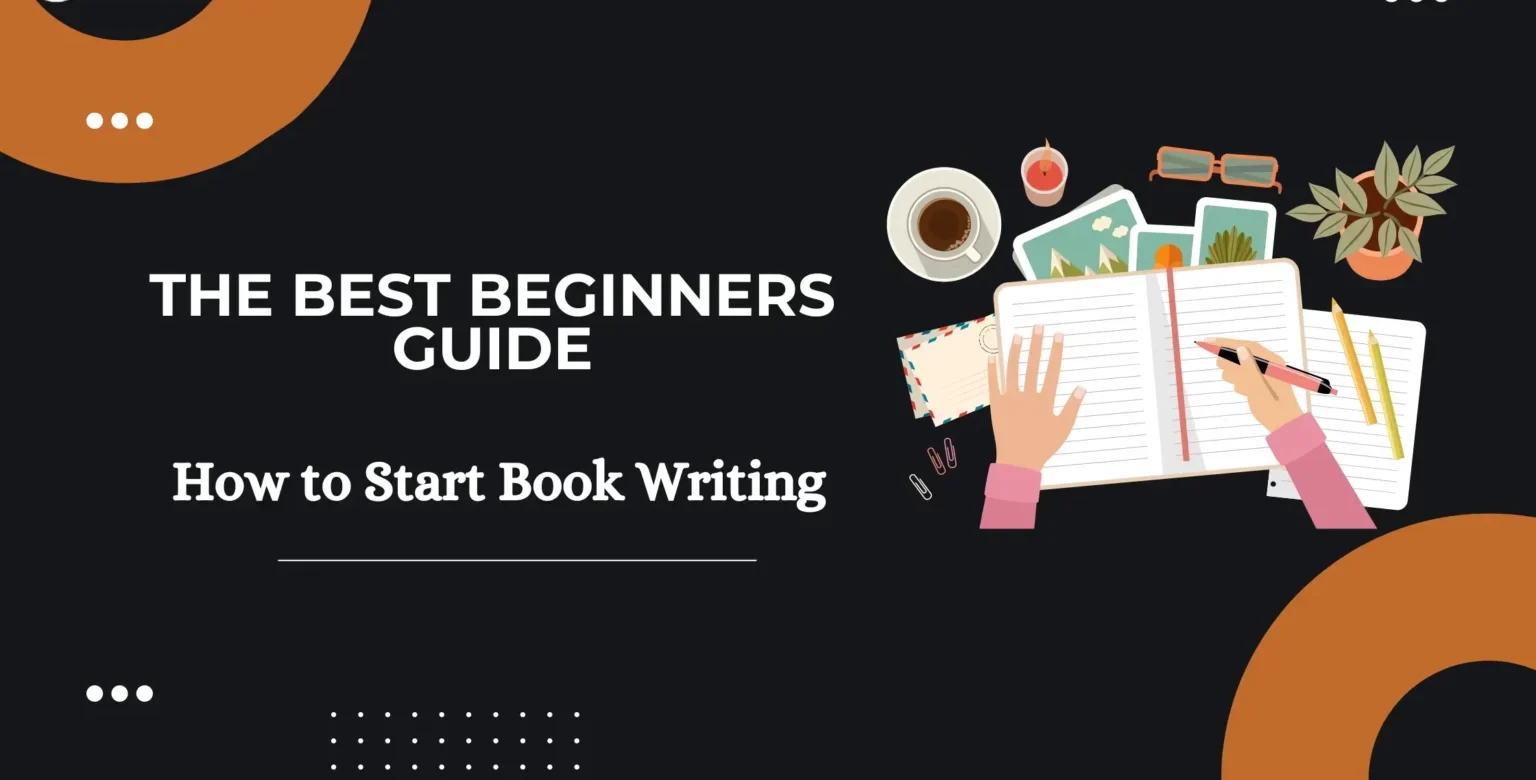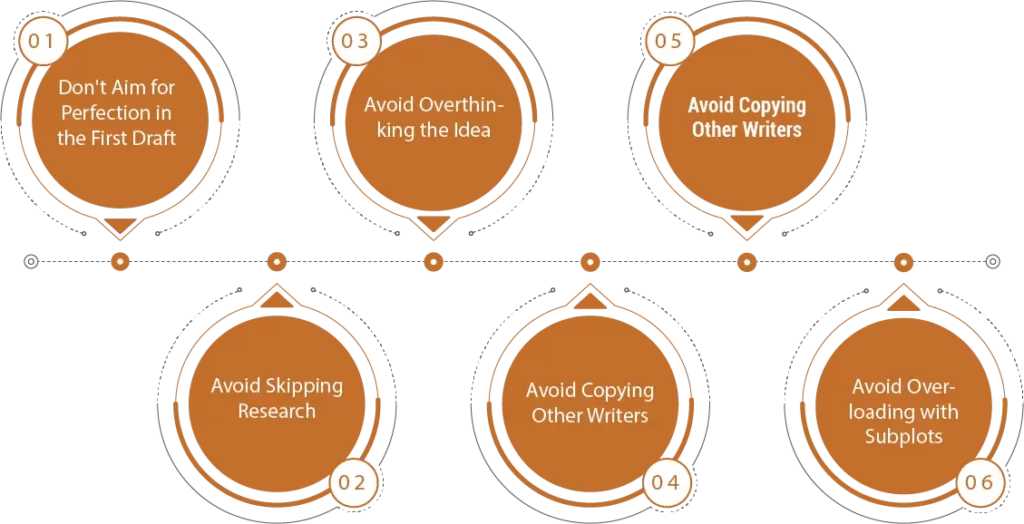- Blog
How to Start Writing a Book: First Steps for Beginners

Are you thinking of writing your first book? Fantastic! But we know that tackling the whole book writing process, especially how to start writing a book for beginners, seems like a mountain to climb. Fear not—we’ve got your back with this simple, step-by-step guide that will help you sail across the world of book writing as a beginner.
Easy Guide on how to start writing a book for beginners
Let’s simplify the process by breaking it down into simple steps, especially for beginners like you
1. Make Your Writing Space More Comfortable
If you intend to write an excellent book and require a writing space,. It is not necessary to have a room with soundproof walls; instead, find a quiet place to work where you can think about your book with a cool mindset—it could be your favorite couch or a corner in a coffee shop. There is no need for a fancy setup, just a chill place where you can focus without interruptions
2. Nail Down Your Book Idea
Before you start, ask yourself some basic questions about your book idea. What’s it about? Why is it cool or important? What got you excited about it in the first place? And who do you think will dig your book? If you are still searching and struggling for your book idea. check out our blog on
We have discussed all the questions in detail in this blog.
3. Sketch Out Your Story
Creating a plan or a roadmap before you begin writing can be very helpful. You can make it as straightforward or as elaborate as you prefer, but the idea is to have a clear goal for your writing sessions. Just like planning a trip, a roadmap can guide you through the writing process and keep you focused.
4. Research Before You Write
Now, let’s talk about research. For non-fiction, hit up libraries or archives. If you’re into fiction, check out books or podcasts that match your vibe. It’s like diving into cool info that can add flavor to your story.
5. Make Writing a Habit
Ready to turn your prep into action? Book writing for beginners should be a habit. Start writing your rough draft by making writing a daily habit. Set simple goals—like a word count for the day—and mark your writing time on your calendar. You got this!
6. Push Through Your First Draft
Here’s the real deal: doubt and writer’s block happen to everyone. Return to your outline or research for a little kick when you hit a wall. And remember, your first book doesn’t have to be a masterpiece. Just keep writing until you reach the end.
7. Revision And Editing
Every good book requires some editing. Be honest with yourself and edit like a pro. Look for clichés, strange details, or anything that feels off in your story. Get some feedback from a friend or a professional book editor if you can.
8. Create Your Second Draft
It is time to start working on the second draft! Apply those adjustments while keeping the big picture in mind. Is your book maintaining the same tone throughout? Does it have a cool theme? And check if there’s any part that’s not pulling its weight.
9. Time to Share Your Book with the World
Now, for the grand finale—publishing. With platforms like the Kindle, getting your book out there is easier than ever. Or, if you’re going the traditional route, send a book proposal to a literary agent. Once it’s out, high-five yourself and maybe start dreaming about your next book adventure.
There you have it—the ABCs of writing your first book. Dive in, have fun with it, and keep those creative juices flowing.
What ‘Not to Do’ When Writing a Book as a Beginner
Trying to hit the bullseye at the first attempt, unclear on how to start writing a book as a beginner, overthinking your idea, fearing failure, neglecting self-care, isolating yourself while writing, and many other pitfalls are the points a writer should be mindful of. Let’s discuss in detail.

1. Don't Aim for Perfection in the First Draft
It’s natural to want your writing flawless, but perfectionism can be a major roadblock. Your first draft is meant to be a raw creation, so don’t get bogged down by making every sentence perfect. Allow yourself the freedom to write without constant self-editing.
2. Avoid Overthinking the Idea
While having a clear concept is crucial, overthinking the idea can lead to paralysis. Instead of endlessly pondering, start writing. Ideas often evolve while writing, and you may discover new and exciting angles.
3. Don't Isolate Yourself
Writing can be a solitary activity, but isolation can lead to creative stagnation. Engage with other writers, join writing groups, and seek feedback. Connecting with a supportive community can provide valuable insights and encouragement.
4. Avoid Fearing Failure
Fear of failure can be paralyzing. Embrace the possibility of making mistakes and view them as opportunities to learn and grow. Every writer faces challenges, and resilience is key to overcoming them.
5. Don't Ignore Feedback Entirely
While your creative vision is essential, completely dismissing feedback can hinder improvement. Be open to constructive criticism, and use it to refine your work. Finding a balance between staying true to your voice and considering valuable suggestions is vital.
6. Don't Rely Solely on Inspiration
Waiting for inspiration to strike before writing may lead to long periods of inactivity. Instead, cultivate a writing habit that allows you to work regularly. Inspiration often emerges during the writing process rather than before it.
7. Avoid Being Overly Descriptive
While vivid descriptions are valuable, avoid overwhelming readers with excessive details. Strive for a balance that enhances the reader’s imagination without slowing down the pacing of your narrative.
8. Avoid Skipping Research
Even in fictional writing, the research adds authenticity. Skipping research on relevant topics, settings, or historical details can result in inaccuracies that may distract or disengage your readers.
9. Don't Neglect Character Consistency
Characters should remain consistent throughout your narrative. Avoid sudden shifts in personality or behavior without proper development or explanation. Consistency contributes to believable and engaging characters.
10. Avoid Copying Other Writers
While it’s natural to be inspired by other writers, avoid copying their style or ideas outright. Develop your unique voice and perspective. Readers appreciate authenticity, and copying may dilute the originality of your work.
11. Don't Underestimate the Importance of Dialogue
Dialogue is a powerful tool for storytelling. Avoid lengthy monologues and aim for natural, engaging conversations. Dialogue adds depth to characters and moves the narrative forward effectively.
12. Avoid Overloading with Subplots
While subplots can enhance complexity, too many can overwhelm the main storyline. Maintain a balance between the central plot and subplots to ensure clarity and coherence in your narrative.
By removing these 12 common pitfalls, beginner writers can swiftly run into the intricate book writing process more effectively and enjoy a more fulfilling creative experience.
Examples: How To Start a Story 5 Example for Beginners
| Dive into the Action | Example: The city was in chaos, sirens were blaring, and explosions lit the night. Picture this: Sarah, your average office worker, runs through deserted streets. |
| Let Them Talk | Example: “Guess what I found?” Jake’s eyes were wide with excitement. Emily leaned in, intrigued. “Spill it!” Jake couldn’t contain the smirk as he handed her an ancient-looking, dusty map. |
| Uncover the Mystery | Example: Picture an old mansion at the end of the street, shrouded in mystery. No one dared enter after dark except Alex. Alex pushed open the creaky gate with a flashlight, stepping into the unknown. |
| Meet Someone Special | Example: On the first day of school, Mia already noticed something odd about Mr. Evergreen. His eyes, this deep forest green, seemed to hold secrets that begged to be unraveled. |
| Jump into the Action | Example: Imagine a dragon’s roar echoing through a canyon and Elena hanging onto a cliff’s edge. Below is a cavern filled with treasure, and you wonder how her quest got this wild. |
Curtain Call
The clock is ticking, it’s high time you should be working on your next masterpiece as you have the simplest guide for your next book along with the examples if you’re up for writing your upcoming best novel. And you know “what you should be aware of” while writing. So, no more hesitation, open up your word file and start running your fingers, as the world wants to know what you have to offer for their next treat.

We are an expert ghostwriting team that takes your imagination, adds a thing or two, and turns it into a successful book.